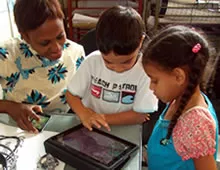
Hand-held computers aid communication, social skills for children with autism, research shows
Mobile touch technology has the potential to considerably enhance how students with autism learn, communicate, engage with others and succeed at school.
That’s the finding from new research by Professor Rhonda McEwen of the Institute of Communication, Culture and Information Technology at U of T Mississauga. In a two-year study involving 36 children with autism at a Toronto public school, the use of off-the-shelf hand-held touch devices for learning led to statistically significant improvements in children’s communication skills, social skills, attention span and motivation.
“The devices increased the students’ level of interest in what was happening in the classroom. They are a good way to teach turn-taking and other kinds of social skills, and the children were highly motivated to engage with the device and with others,” McEwen says. “The research showed that even children with intellectual disabilities have the ability to lead peers and engage in exercises instead of being passive agents in classroom.”
The study began in 2010 with 12 mostly non-verbal students with autism of all ages at Beverley Public School, a primary school for children with intellectual and physical disabilities. Over six months, the children used two types of devices—the iPod Touch and iPad tablet—for a range of tasks, including identifying themselves to others and completing literacy and numeracy exercises.
McEwen investigated how using the devices affected the children’s ability to identify two-dimensional objects on the screen and engage in expressive and receptive communication. Teachers collected the data and shared their observations with McEwen and her research assistant, a UTM psychology undergraduate student. The students were also videotaped.
Nine of the children (75 per cent) showed significant improvement in overall communication skills as well as in their motivation, attention span and ability to interact socially. The two-year study has been expanded to include 36 students with autism, with early results of the larger study showing similar findings.
“I’m glad this study was performed, because it’s important for other people to realize that we have not fully tapped the ways in which we can improve both the receptive and expressive communication skills in folks not able to use words reliably in their communication with others,” says Marg Spoelstra, executive director of Autism Ontario. “If these technologies can help in the classroom setting, that means good news for kids with autism and their learning, and instructors have the tools to be successful in educating them.”
McEwen has recently launched a new study that examines the effects of using tablet computers on the cognitive development of young children without special needs. In collaboration with a post-doctoral fellow at U of T, she will be studying 120 students in junior kindergarten to Grade 2 at Clinton Street Junior Public School in Toronto who are using math applications on four different types of tablets.
Her research, she hopes, will inspire educators to consider ways to more effectively use technology in the classroom. “Curriculum integration is key. These technologies have the capacity to promote student-led and peer-based learning. Teachers who can creatively find ways to make them part of the lessons will be successful.”
